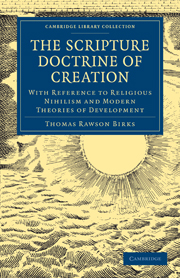 The Scripture Doctrine of Creation
The Scripture Doctrine of Creation Published online by Cambridge University Press: 29 August 2010
All Science depends on a double process of induction and deduction. The first arranges and classifies phenomena, and thus attains to certain empirical laws, which embody the results of past observation in their most comprehensive form. The second traces the results of some probable or possible hypothesis, to decide on its agreement or disagreement with these results. In case of agreement, it is assumed to be true, and its further consequences are then traced, to supply new confirmations of its truth, and anticipate the results of new and varied experiments.
The theory, which would explain the origin and nature of all organic life, apart from any acts of creative power, by a process of evolution, must thus be open to a double test. Does it fulfil the claims of sound, philosophical induction, and sum up correctly the results of actual observation on the largest scale? Does it conform to the rules of deductive science. start from clear axioms and definite laws, and trace out consequences in such a way as to admit of being tested by new observations? In the present work an answer will be given to the former question alone. The other calls for a more expanded reply.
The nature, origin, and mutual relations, of existing plants and animals, and still further, of all the extinct species and remains of geology, is the problem which calls for solution. On the side of science, its difficulty is plainly very great.
To save this book to your Kindle, first ensure [email protected] is added to your Approved Personal Document E-mail List under your Personal Document Settings on the Manage Your Content and Devices page of your Amazon account. Then enter the ‘name’ part of your Kindle email address below. Find out more about saving to your Kindle.
Note you can select to save to either the @free.kindle.com or @kindle.com variations. ‘@free.kindle.com’ emails are free but can only be saved to your device when it is connected to wi-fi. ‘@kindle.com’ emails can be delivered even when you are not connected to wi-fi, but note that service fees apply.
Find out more about the Kindle Personal Document Service.
To save content items to your account, please confirm that you agree to abide by our usage policies. If this is the first time you use this feature, you will be asked to authorise Cambridge Core to connect with your account. Find out more about saving content to Dropbox.
To save content items to your account, please confirm that you agree to abide by our usage policies. If this is the first time you use this feature, you will be asked to authorise Cambridge Core to connect with your account. Find out more about saving content to Google Drive.